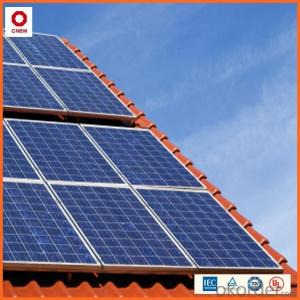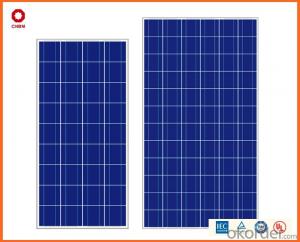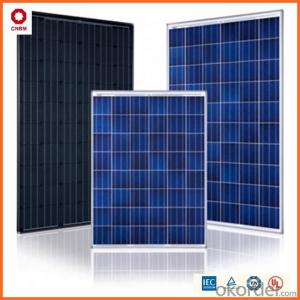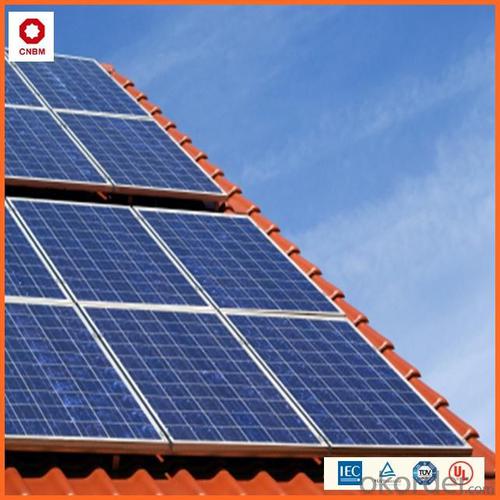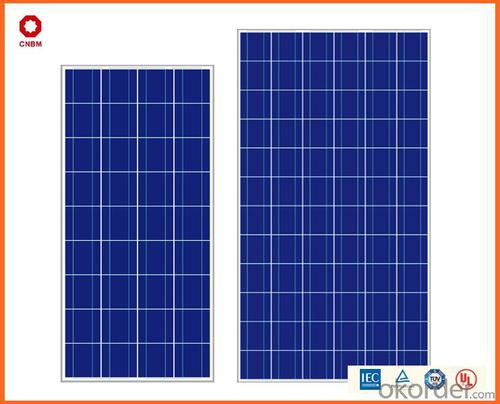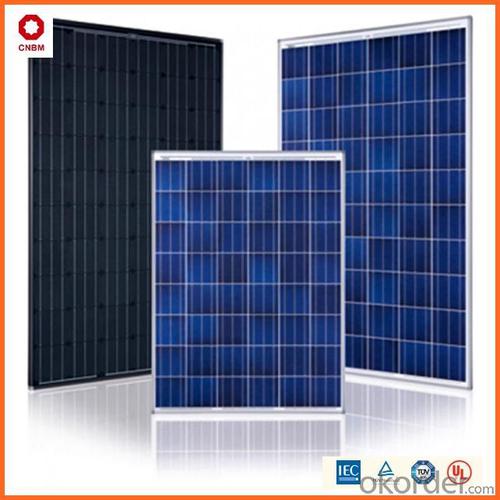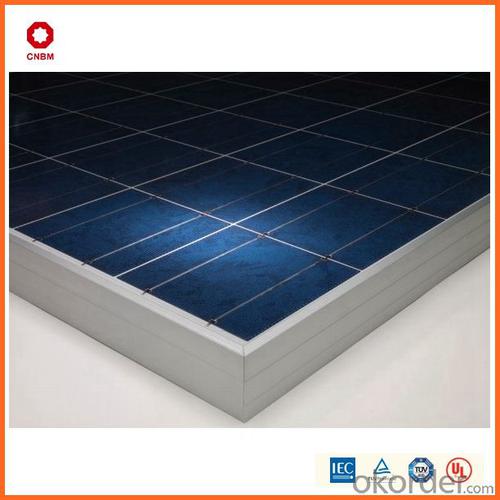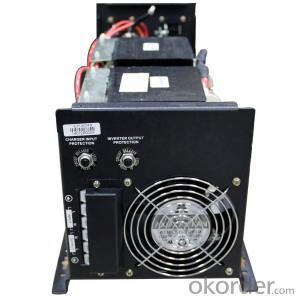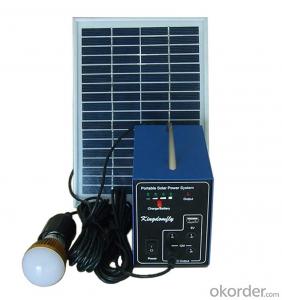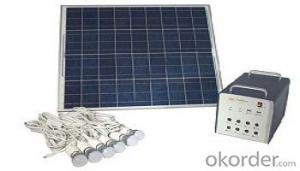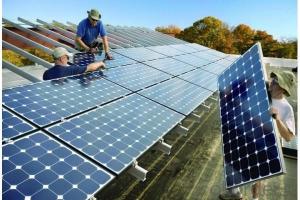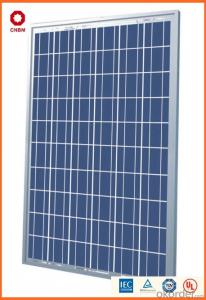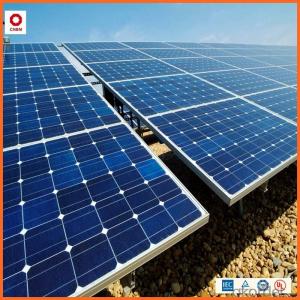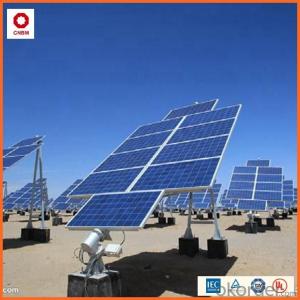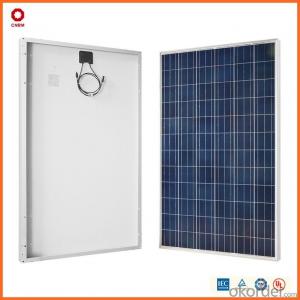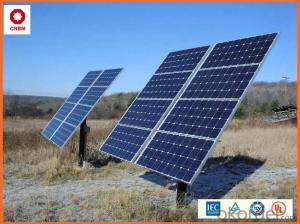Solair Solar Energy Systems - !!! Hot on Sale!!! Stock 260W Poly Solar Panel USD0.45/W A Grade Good Solar Panel
- Loading Port:
- China main port
- Payment Terms:
- TT OR LC
- Min Order Qty:
- 1 watt
- Supply Capability:
- 10000000 watt/month
OKorder Service Pledge
OKorder Financial Service
You Might Also Like
Product Description:
Hot Sale !!! Quality and Safety of 245w-320w Poly Solar Panel
1. Rigorous quality control meets the highest international standards.
2. High-transmissivity low-iron tempered glass, strong aluminium frame.
3. Using UV-resistant silicon.
4. IS09001/14001/CE/TUV/UL
Warranties of 245w-320w Poly Solar Panel
1. 10 years limited product warranty
2. 15 years at 90% of the minimal rated power output
3. 25 years at 80% of the minimal rated power output
Technical date of 245w-320w Poly Solar Panel
ITEM NO.: | Mono 125*125 cell ,36pcs . Power range from 80Wp-100Wp | ||||||||
Maximum Power(W) | 80 | 85 | 90 | 95 | 100 | ||||
Optimum Power Voltage(Vmp) | 17.81 | 17.89 | 17.94 | 17.99 | 18.06 | ||||
Optimum Operatige Current(Imp) | 4.78 | 4.91 | 5.12 | 5.35 | 5.59 | ||||
Open Circuit Voltage(Voc) | 21.98 | 22.05 | 22.14 | 22.28 | 22.45 | ||||
Short Circuit Current(Isc) | 4.95 | 5.15 | 5.36 | 5.65 | 5.84 | ||||
Solar Cell: | 125*125 Mono | ||||||||
Number of Cell(pcs) | 4*9 | ||||||||
Brand Name of Solar Cells | JA Cell, Bluesun Cell | ||||||||
Size of Module(mm) | 1580*808*35 | ||||||||
Caple & Connector Type | Pass the TUV Certificate | ||||||||
Frame(Material Corners,etc.) | Aluminium-alloy | ||||||||
Backing (Brand Type) | TPT | ||||||||
Cell Efficiency for 100W(%) | 15.8% | ||||||||
Weight Per Piece(KG) | 12.0KG | ||||||||
FF (%) | 70-76% | ||||||||
Junction Box Type | Pass the TUV Certificate | ||||||||
Tolerance Wattage(e.g.+/-5%) | ±3%, or 0-3% | ||||||||
Front Glass Thikness(mm) | 3.2 | ||||||||
Temperature Coefficients of Isc(%) | +0.04 | ||||||||
Temperature Coefficients of Voc(%) | -0.38 | ||||||||
Temperature Coefficients of Pm(%) | -0.47 | ||||||||
Temperature Coefficients of Im(%) | +0.04 | ||||||||
Temperature Coefficients of Vm(%) | -0.38 | ||||||||
Temperature Range | -40°C to +85°C | ||||||||
Surface Maximum Load Capacity | 2400Pa | ||||||||
Allowable Hail Load | 23m/s ,7.53g | ||||||||
Bypass Diode Rating(A) | 12 | ||||||||
Warranty | 90% of 10 years,80% of 25 years. | ||||||||
Standard Test Conditions | AM1.5 1000W/ 25 +/-2°C | ||||||||
Packing | carton or pallet | ||||||||
1*20' | 25 Pallets / 450pcs | ||||||||
1*40'STD | 25 Pallets / 100pcs | ||||||||
Features of our products:
• High conversion efficiency mono/poly-crystalline amorphous silicon solar cells
• Modules incorporate high performance bypass diodes to minimize the power drop caused by shading
• High transmittance, low-iron tempered glass
• High performance EVA encapsulant to prevent destroying and water.
• AI frame: without screw, corner connection. 8 holes on the frame can be installed easily
• Good performance of preventing from atrocious weather such as wind and hails
• Certifications: CE IEC TUV VDE UL, Class I
• 10 years 90% power output warranty

Shipping of 245w-320w Poly Solar Panel
By Sea | Delivery from Shanghai or Ningbo seaport |
By Air | Departure from Shanghai Pudong Airport |
By Express | Post by DHL, EMS, UPS, TNT. |
- Q: Can solar energy systems be used in powering green hotels or eco-resorts?
- Yes, solar energy systems can definitely be used in powering green hotels or eco-resorts. Solar power is a clean and renewable source of energy that can greatly contribute to reducing the carbon footprint of these establishments. By installing solar panels on the roofs or open spaces of hotels and resorts, they can generate electricity from the sun's rays and use it to power their operations. Solar energy systems can provide a significant portion, if not all, of the electricity needed to run a green hotel or eco-resort. This includes powering lighting systems, heating and cooling systems, water pumps, and other electrical appliances. The excess energy generated during the day can also be stored in batteries or fed back into the grid to be used during nighttime or low sunlight periods. Implementing solar power in these establishments not only helps reduce their dependence on fossil fuels but also makes them more self-sufficient and resilient to power outages. It aligns with their commitment to sustainability and eco-conscious practices, attracting environmentally conscious travelers who prioritize staying in green accommodations. Furthermore, solar energy systems can also enhance the overall guest experience at these hotels and resorts. They can provide opportunities for educational tours and demonstrations where guests can learn about the benefits of solar power and the importance of renewable energy sources. This can create awareness and inspire guests to adopt sustainable practices in their own lives. In conclusion, solar energy systems are an excellent choice for powering green hotels or eco-resorts. They offer a clean, renewable, and reliable source of electricity that aligns with their sustainability goals. By harnessing the power of the sun, these establishments can reduce their carbon footprint, enhance their guest experience, and contribute to a more sustainable future.
- Q: Can solar energy systems be used for powering military bases?
- Yes, solar energy systems can be used to power military bases. In fact, many military bases around the world are increasingly adopting solar energy as a reliable and sustainable source of power. Solar panels can be installed on rooftops, open spaces, or even integrated into buildings' facades, providing clean electricity to support the energy needs of military facilities. This not only helps reduce reliance on fossil fuels but also enhances energy security and resilience for military operations.
- Q: Can solar energy systems be used in powering beauty salons or spas?
- Yes, solar energy systems can certainly be used to power beauty salons or spas. Solar panels can be installed on the roofs or other available spaces of these establishments to generate electricity from sunlight. This renewable energy source can then be used to power various equipment, lighting, heating, and cooling systems within the salon or spa. By utilizing solar energy, these businesses can reduce their reliance on the grid, lower their energy costs, and contribute to a more sustainable and environmentally-friendly operation.
- Q: Can solar energy systems be used in areas with limited roof access for maintenance?
- Solar energy systems can indeed be utilized in areas where roof access for maintenance is limited. Although the usual practice is to install solar panels on rooftops for maximum exposure to sunlight, there are alternative choices to consider. One option is to install ground-mounted solar panels in areas where roof access is restricted, making maintenance and cleaning tasks simpler. Furthermore, solar panel systems can be integrated into other structures like carports or pergolas, offering an alternative approach to the conventional rooftop installations. These alternatives guarantee the effective utilization of solar energy systems in areas with limited roof access for maintenance.
- Q: Can solar energy be used at night?
- No, solar energy cannot be directly used at night as it relies on sunlight to generate electricity. However, energy storage systems such as batteries can be used to store excess solar energy during the day and provide power during the night.
- Q: How do solar energy systems impact the quality of indoor air?
- Solar energy systems have a positive impact on the quality of indoor air. Unlike fossil fuel-based power generation, solar energy does not emit harmful pollutants such as carbon dioxide, sulfur dioxide, or nitrogen oxides. By replacing traditional energy sources with solar power, we can significantly reduce air pollution and improve the air quality inside buildings, making them healthier and safer for occupants.
- Q: Are there any risks of theft or vandalism with solar energy systems?
- Yes, there are some risks of theft or vandalism with solar energy systems. Solar panels and other equipment used in solar energy systems can be valuable and attractive targets for theft. Thieves may attempt to steal the panels or other components of the system to sell them on the black market. Additionally, solar energy systems are typically installed in remote or isolated areas, making them more vulnerable to theft as they may not be easily monitored. Vandalism is also a concern, as solar panels can be damaged or destroyed intentionally by individuals who may have a grudge against the owner or simply for the sake of causing damage. This can result in a loss of investment and disruption of energy production. To mitigate these risks, homeowners and businesses can take several precautions. Installing security measures such as surveillance cameras, motion sensors, or alarms can help deter theft or vandalism. Placing panels in more visible and accessible areas can also make them less attractive targets. Additionally, marking the panels with unique identifiers can make it more difficult for thieves to sell them. Insurance coverage is another important consideration to protect against theft or vandalism. Many insurance companies offer specific policies that cover solar energy systems, providing compensation in case of theft or damage. Overall, while the risks of theft or vandalism exist, they can be mitigated through preventive measures and insurance coverage. It is important for solar energy system owners to be aware of these risks and take appropriate steps to protect their investment.
- Q: Are there any ongoing monitoring requirements for solar energy systems?
- Yes, there are ongoing monitoring requirements for solar energy systems. Monitoring is essential to ensure that the solar energy system is operating efficiently and effectively. It helps in identifying any potential issues or malfunctions, allowing for timely repairs or maintenance. Ongoing monitoring typically involves tracking the system's performance, including energy production, system uptime, and any deviations from expected outputs. This can be done through various monitoring tools and technologies, such as real-time monitoring software, data loggers, or remote monitoring systems. Additionally, some jurisdictions or incentive programs may have specific monitoring requirements to ensure compliance with regulations or eligibility criteria. Regular monitoring helps maximize the benefits of solar energy systems and ensures their long-term performance and durability.
- Q: How does the distance between solar panels affect their performance?
- The distance between solar panels can significantly impact their performance. When solar panels are placed too close to each other, it can lead to shading issues. Shading occurs when one panel blocks the sunlight from reaching another panel, reducing its efficiency. This can result in a decrease in overall energy output. On the other hand, if solar panels are spaced too far apart, it can lead to inefficiencies in space utilization. As solar panels require a certain amount of space to capture sunlight, larger gaps between panels can result in wasted space that could have been utilized for additional panels. The ideal distance between solar panels depends on various factors such as panel tilt, location, and orientation. Generally, a recommended distance is around 1.5 times the height of the panels. This spacing allows for efficient utilization of space while minimizing shading issues. Moreover, the distance between solar panels also affects the efficiency of the wiring system. With panels placed too far apart, more wiring may be required, leading to increased costs and potential energy losses due to resistance in the wiring. In conclusion, the distance between solar panels is crucial for their performance. It should be carefully considered to balance the need for optimal space utilization, minimize shading issues, and ensure an efficient wiring system. By finding the right balance, solar panels can maximize their energy production and contribute to a more sustainable and renewable energy future.
- Q: Can solar energy systems be used in areas with limited access to solar energy advocacy campaigns?
- Yes, solar energy systems can still be used in areas with limited access to solar energy advocacy campaigns. While advocacy campaigns can help raise awareness and support for solar energy, the installation and use of solar energy systems ultimately depend on the availability of sunlight. Even in areas with limited access to advocacy campaigns, solar energy systems can still be implemented as long as there is sufficient sunlight to generate electricity through solar panels. In fact, installing solar energy systems in such areas can bring numerous benefits, such as reducing reliance on fossil fuels, providing access to clean and renewable energy, and potentially lowering energy costs.
Send your message to us
Solair Solar Energy Systems - !!! Hot on Sale!!! Stock 260W Poly Solar Panel USD0.45/W A Grade Good Solar Panel
- Loading Port:
- China main port
- Payment Terms:
- TT OR LC
- Min Order Qty:
- 1 watt
- Supply Capability:
- 10000000 watt/month
OKorder Service Pledge
OKorder Financial Service
Similar products
Hot products
Hot Searches
Related keywords
